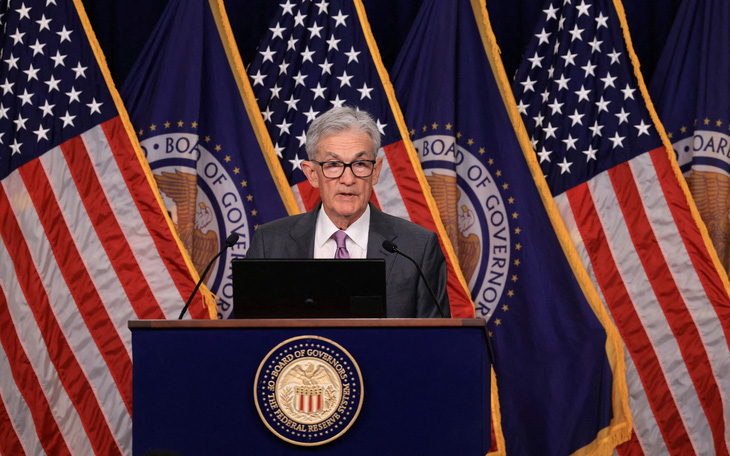On January 2 (local time), American financial giant Morgan Stanley became the latest bank to leave the Net Zero Banking Alliance (NZBA). Earlier this week, Citigroup and Bank of America also withdrew from NZBA.

Photo taken outside Morgan Stanley Bank in New York, USA - Photo: REUTERS
Earlier in December, Goldman Sachs Group and Wells Fargo also left the alliance. It can be seen that withdrawing from the NZBA has become a trend in the US banking and finance industry, partly reflecting the tendency to defend against pressure from the political world.
Banks flee under pressure
The NZBA was established in 2021 to ensure member banks maintain consistency in lending and investing towards the goal of achieving net zero emissions by 2050 as set out in the Paris Agreement.
However, the future of NZBA looks bleak as a number of banks have announced their withdrawal from the alliance.
Although Morgan Stanley did not give a reason for its decision, analysts said the top US banks had come under pressure from some Republican politicians to join the NZBA, with allegations that any move to restrict the financing of fossil fuel companies could violate antitrust laws, according to Reuters.
Earlier, the Republican-led US House Judiciary Committee released a report showing evidence of collusion and anti-competitive behavior in the financial sector. They accused financial institutions of imposing ESG (environmental, social and governance) sustainability goals on US businesses. ESG is a criterion initiated by climate coalitions.
Not only that, US House Judiciary Committee Chairman Jim Jordan has specifically criticized climate coalitions such as Climate Action 100+, Glasgow Net Zero Financial Alliance (GFANZ) - NZBA is a small branch of this coalition - for allegedly undermining fair competition.
GFANZ member organizations have come under intense pressure from Republican politicians in recent years, according to investment manager Mark Segal. Many Republican lawmakers have warned that financial institutions such as banks, insurers, property owners and investors could face legal action for joining coalitions to fight climate change. They have also been threatened with being barred from entering into government contracts.
While it is unclear what impact President-elect Donald Trump's return to the White House in the coming weeks will have, one thing is certain: Republicans have increased pressure on banks since Trump's victory.
As a result, banks and large corporations are increasingly cautious about making any moves to avoid conflict with the new administration, and are gradually withdrawing from climate initiatives.
Abandon climate efforts?
The timing of the exodus of major banks from the NZBA just before Mr Trump’s return partly reflects the political implications of these changes. The question is how the banks’ departure from the NZBA will affect efforts to combat climate change in the US and globally.
As for Morgan Stanley, the Wall Street giant remains committed to addressing climate change through its own business model. Specifically, the bank will continue to provide advisory services and capital to support clients in transitioning to sustainable business practices and reducing carbon emissions, according to American Banker.
A Morgan Stanley representative affirmed that "the company's commitment to the goal of zero emissions remains unchanged." Meanwhile, a Bank of America representative affirmed that the bank will continue to support and meet the needs of customers in the field of combating climate change and carbon neutrality, "as a company that has achieved carbon neutrality by 2021."
In addition, some other banks such as Citi said they are shifting their focus to supporting GFANZ in its transition to a low-carbon economy. "We have decided to leave NZBA and focus on supporting GFANZ in its new phase," a Citi representative said. Besides Citi, Bank of America still retains its membership in GFANZ.
While banks are still committed to their climate goals, they face challenges in balancing climate mitigation initiatives with political pressures, especially as many climate loans and investments are at odds with the upcoming political landscape in Washington.
By choosing to pursue sustainability goals independently, banks can promote new business practices as part of a broader global response to climate change, according to Saptakee S from climate analytics site Carbon Credits.
Turning away from the ESG alliance
In the same situation as NZBA, financial institutions such as State Street or JPMorgan Chase also withdrew from the ESG Climate Action 100+ alliance from 2024. According to senior policy analyst Bonner Russell Cohen, ESG funds in these alliances are being turned away by investors.
Many experts from Columbia University and the London School of Economics consider ESG funds to be "poor performers". Typically, ESG-based investing focuses on companies that commit to zero emissions. However, many scholars say these activities have low investment returns and are often not financially sustainable.
 US banks sue Fed over stress test
US banks sue Fed over stress testSource: https://tuoitre.vn/loat-ngan-hang-my-rut-khoi-lien-minh-net-zero-chuyen-gi-xay-ra-20250103225918496.htm



![[Photo] Prime Minister Pham Minh Chinh receives Mr. Jefferey Perlman, CEO of Warburg Pincus Group (USA)](https://vstatic.vietnam.vn/vietnam/resource/IMAGE/2025/4/18/c37781eeb50342f09d8fe6841db2426c)


![[UPDATE] April 30th parade rehearsal on Le Duan street in front of Independence Palace](https://vstatic.vietnam.vn/vietnam/resource/IMAGE/2025/4/18/8f2604c6bc5648d4b918bd6867d08396)




























































































Comment (0)